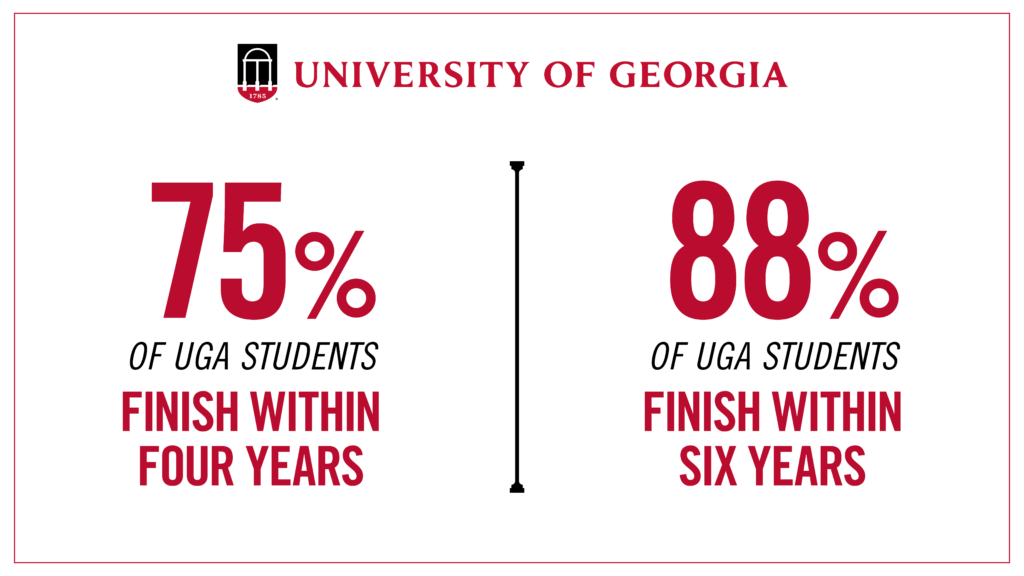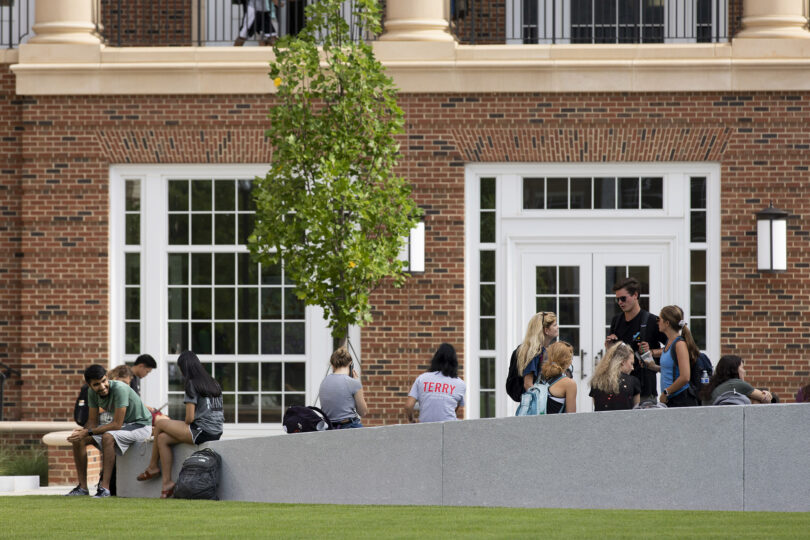Completion rates at the University of Georgia have reached record highs as ongoing initiatives across campus provide students with support to help them succeed.
The latest data shows that UGA’s four-year completion rate has increased to a record 75.1%, up from 72.1% last year. The six-year completion rate also reached a new high at 88.1%, up from 87.8% a year ago. The retention rate remains strong at 94.3%.
“I am thrilled that the University of Georgia has achieved record completion rates once again,” said President Jere W. Morehead. “UGA’s holistic approach to supporting students in their undergraduate education along with the outstanding efforts of our faculty, staff and donors are helping our students attain their academic goals and maximize their prospects for continued success in the future.”
UGA’s success exceeds the average completion and retention rates of its peer institutions. The average six-year completion rate at UGA’s comparator peer institutions is 80.3%, while the average rate of UGA’s aspirational peers is 85.3%. The average retention rate at comparator peer institutions is 91.3%. UGA also far exceeds the average retention and six-year completion rates for other Southeastern Conference schools, coming in more than 4% higher than the average retention rate and more than 12% higher than the average six-year completion rate among SEC institutions.
Hiring more faculty and advisors to meet students’ needs
Over the past few years, faculty hiring initiatives have contributed to these retention and completion rates by strengthening UGA’s academic profile and providing students with access to highly talented scholars. Hiring initiatives have focused on recruiting faculty in high-demand disciplines in the Franklin College of Arts and Sciences, the Terry College of Business and the School of Public and International Affairs.
Expanded tutoring, mentorship and peer-learning programs have further bolstered student support. UGA’s Division of Academic Enhancement offers free tutoring in nearly 300 undergraduate courses plus writing support and standardized test prep.
 Additionally, UGA has made a concerted effort to enhance advising services to help students stay on track academically. Degree completion teams, for example, harness resources from the Office of Instruction, the Division of Student Affairs and Student Care and Outreach to provide holistic and proactive support for students as part of the Connect & Complete initiative. Additional academic advisors have been hired university-wide to support students in high-demand areas, bringing the total to approximately 150 undergraduate advisors in schools, colleges and the Exploratory Center.
Additionally, UGA has made a concerted effort to enhance advising services to help students stay on track academically. Degree completion teams, for example, harness resources from the Office of Instruction, the Division of Student Affairs and Student Care and Outreach to provide holistic and proactive support for students as part of the Connect & Complete initiative. Additional academic advisors have been hired university-wide to support students in high-demand areas, bringing the total to approximately 150 undergraduate advisors in schools, colleges and the Exploratory Center.
“UGA has been very intentional in setting students up for success,” said Marisa Anne Pagnattaro, vice president for instruction. “Advisors play a key role in seeing a student need and advocating for resources. We want our students to succeed in the classroom, graduate and thrive in their careers.”
Resources for well-being and mental health
Efforts to further strengthen retention and completion rates include the enhancement of Welcome UGA, a campus-wide initiative that celebrates incoming and returning students, and a well-being initiative launched this year that provides students with clinical and non-clinical resources. UGA’s efforts in this area include $1 million in private funds over the next two years to expand the university’s mental health and well-being offerings.
Students are also set up to succeed outside of the classroom through living learning communities that give students chances to grow academically and socially within immersive environments. Examples of these communities include the Entrepreneurship Living Learning Community, Spanish and French language communities, Art of Wellness and Franklin Residential College.
Another initiative that supports students is experiential learning, which gives students opportunities outside of the classroom to explore and solidify their skills and competencies. Every UGA undergraduate student completes this hands-on learning requirement while earning their degree.
Need-based scholarships and student emergency funds
To reduce financial barriers to degree completion, UGA has significantly increased need-based scholarships. The Georgia Commitment Scholarship Program has created over 645 student scholarships and committed almost $100 million toward need-based awards. For the 2021-2022 academic year, the Office of Student Financial Aid provided $388.7 million of federal, state, institutional and other/external aid to 29,482 undergraduate students.
The Student Care and Outreach office now centrally coordinates the Student Emergency Fund and helps to connect emergency financial assistance directly to the students who need it. More financial assistance comes from the Sunshine Fund, which has seen contributions continue well beyond the funding increase for student mental health support experienced during the height of the COVID-19 pandemic.
“Our determination to innovate, our commitment to service and our focus on impactful solutions are evident in these UGA initiatives that have helped to nurture student success,” said S. Jack Hu, senior vice president for academic affairs and provost. “I am optimistic our continued and future efforts, including active learning, will further strengthen students’ educational experiences.”








